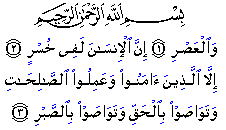General
From Issue: 464 [Read full issue]
| Living the Quran |
Al-Asr
(The Declining Day)
This short surah of three verses outlines a complete system for human life based on the Islamic viewpoint. It defines, in the clearest and most concise form, the basic concept of faith in the context of its comprehensive reality. In a few words the whole Islamic constitution is covered and in fact, the nation of Islam is described in its essential qualities and its message in one verse only: the third. This is the eloquence of which Allah alone is capable. The great fact which this surah affirms is simply that throughout the history of man there has been one worthwhile and trustworthy path - that which the surah indicates and describes. All other paths lead only to loss and ruin. As it says in outline, that path is first the adoption of faith, followed up with good deeds and exhortation to follow the truth and to steadfastness:
Consequently, whenever two companions of the Messenger of Allah were about to depart from each other, they would read this surah, after which they would shake hands. This was indicative of a pledge to accept this doctrine fully, to preserve this faith, piety and a willingness to counsel each other to follow the truth and remain steadfast. It was a mutual compact to remain good elements in an Islamic society established according to that doctrine and to preserve the foundation of this society. Source: |
| Understanding the Prophet's Life |
The Registers of Deeds In a hadith narrated by Sayyida Aisha, the Prophet said that all the deeds that we perform are written down in three registers:
The second register of deeds is especially important for us to consider because there is no Divine pardon in cases where personal rights have been violated. Forgiveness can only come from the person concerned - either directly or when Allah makes it possible for that person to grant a pardon. The Prophet Muhammad said in this regard: Source: "In The Early Hours" - Khurram Murad |
| Blindspot! |
Timidity Source: |
